Latakasturi – Abelmoschus moschatus Uses, Research
Musk mallow – Abelmoschus moschatus – Muskdana seeds are added to coffee for flavoring. Its leaves are used as vegetables. It cleanses urinary bladder, acts as aphrodisiac and is useful in eye disorders
Botanical name- Hibiscus abelmoschus Linn. (Abelmoschus moschatus Medik)
Family- Malvaceae (Karpasa Kula)
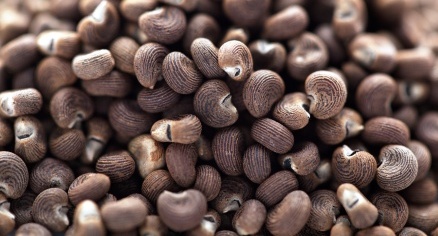
Table of Contents
Vernacular names
Names in different languages:
Hindi name-Kasturi bhendi
English name- Musk Mallow, Musk Seeds, Ambrette, Yorka okra, Ornamental okra
Telugu name- Kastur benda, Kasturi Bendavittulu
Tamil name- Vettilaikkasturi
Arabian name – Habbul Mushk
Farsi name – Mushk Dana
Bengali name – Kal Kasturi
Marathi name – Kastur Bhed
Sanskrit Synonyms
Lata Kasturi – Seeds odor resembles musk
Katuka, Katukahvaya – Pungent fruits
Gandhapoora – Seeds are aromatic
Distribution
Found in southern India
Classical categorization
Kaiyadeva Nighantu – Oshadhi Varga
Bhava Prakasha – Poorva Khanda, Mishra Prakarana, Karpooradi Varga
Major chemical constituents
Seeds contain oil (19.5%) unsaponifiables etc, Trans-2-trans-b- farnesyl acetain, ambrettolide, fornesol etc.
(Reference: Illustrated Dravyaguna VIjnana, Vol. II, by Dr JLN Shastry)
Seed analysis reports 11.1% moisture, 31.5% crude fiber; 14.5% lipids, 13.4% starch, 2.3% protein, volatile oil (0.2-0.6% ) and ca/ 5% resin (Srivastava 1995).
Analysis of volatiles report myricetin-3-glucoside and a glycoside of cyanidin in flowers, an aromatic constituent in seeds, beta-sitosterol and its beta-D-glucoside, myricetin and its glucoside in leaves and petals and beta-sitosterol from dry fruit husk (Rastogi and Mehrotra 1991a,b).
Uses
Abelmoschus moschatus Uses:
Basti Vishodhini – Cleanses urinary bladder
Vrushya – aphrodisiac, improves vigor
Chakshushya – improves vision, good for eyes, useful in eye disorders
Chedani – cutting in nature
Shleshmajit – Kaphahara – balances Kapha, useful in productive cough, asthma
Indications
Indicated in –
Trushna – excessive thirst
Vastyama – urinary tract disorders
Asyaroga – oral disorders, bad breath problem
It acts as a cardiac stimulant, used in diarrhea, premature ejaculation, erectile dysfunctionAmbrette oil is extracted from seed, and is used in the perfume industry.
The seeds are valued for the volatile oil present in the seed coat.
Roots and leaves are cures for gonorrhea (Agharkar 1991).
In diet: Leaves are used as vegetable, seeds are added to coffee
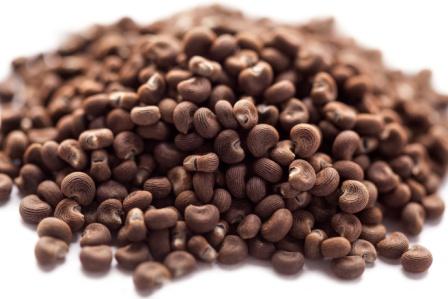
Medicinal properties
Medicinal properties of musk mallow:
Rasa (taste) – Tikta – bitter, Madhura – sweet, Katu – Pungent
Guna (qualities) – Laghu – light to digest, Rooksha – dryness, Teekshna – strong, piercing
Vipaka- Katu – Undergoes pungent taste conversion after digestion
Veerya – Sheeta – Coolant
Effect on Tridosha – Balances Kapha and Pitta Dosha
Pharmacological actions – Aphrodisiac, Digestive, Expectorant
Part used, dosage
Part used- seeds
Dosage- powder 1-3 g
Morphology
Tall annual herb, stems clothed with long hairs
Leaves – Upper leaves are palmately lobed, each lob is serrate, irregularly toothed, hairy on both the surface
Flowers – Yellow with purple at center
Fruits – Capsules, oblong lanceolate
Seeds – Sub reniform, blackish
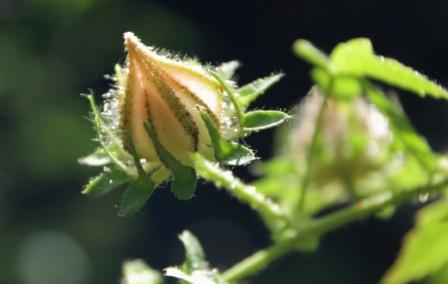
Ayurvedic medicines
Ayurvedic medicines with Lata Kasturi ingredient:
Shilapravang – used as aphrodisiac
Kasturyadi gulika
Brahmi vati
Bala taila
Manasamitra gulika
Research, side effects
Research:
antioxidant, free radical scavenging, antimicrobial and antiproliferative activities
Side effects:
Seek medical advice for usage during pregnancy and lactation.
It can be used in children in small doses.
Interaction with medicines, supplements
Can this be used while taking Homeopathic medicine?
Yes. This product does not react with homeopathic medicine.
Can this medicine be continued while taking supplements like multivitamin tablets, Omega 3 fatty acids etc?
Yes. Generally, this product goes well with most dietary supplements. However, if you are taking more than one product per day, please consult your doctor for an opinion.
With western
medicines
Seek your
doctor’s advice if you are taking this product along with other western
(allopathic / modern) medicines. Some Ayurvedic herbs can interact with modern
medicine.
If both Ayurvedic and allopathic medicines are advised together, then it is
best to take Allopathic medicine first, wait for 30 minutes and then take the
Ayurvedic medicine.
Sanskrit verse
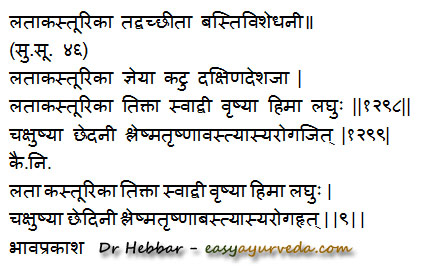
Musk mallow remedies
Musk Mallow Hibiscus abelmoschus Remedies: Bad Breath, Aphrodisiac – By Dr MS Krishnamurthy
Musk Mallow or Muskdaana is an anti-aging and rejuvenating Ayurvedic herb. It is called Lata Kasturi in Sanskrit.
The plant is named so because if the seeds are macerated on soaking in water or liquids it gets the mild odour similar to the musk (Kasturi).
The plants are found usually in temperate regions. This is located and cultivated abundantly in Bengal, Bihar, Uttar pradesh etc.
Seeds are the main usable parts and rarely the leaves and roots are also used.
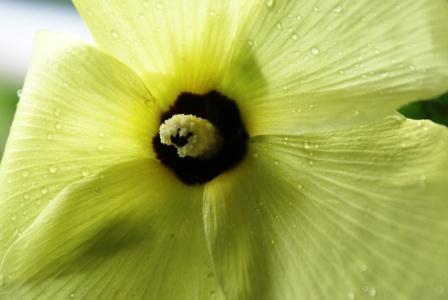
The seeds are sweet mixed bitter in taste, cold and light in quality. It is capable of treating the phlegm, thirst, urinary disorders, male sexual debility etc. In fact it is expectorant, mild coolant, anti flatulent, appetizer and pacifier of high Pitta disorders.
The below given points show its importance being simple and effective remedies in the treatment of various ill health conditions-
1. Leaf and root paste for burning sensation in scalp or forehead:
The leaf or root are taken and fine paste is made by pounding with water or aloe vera juice/pulp. This is applied to the forehead or middle of the scalp. This pacifies the burning sensation quite effectively.
2. Fine powder for bad breath and dryness of mouth:
Fine powder of the seeds is retained in the mouth or chewed. for 5 – 10 minutes of time. This relieves bad breath and dryness of the mouth.
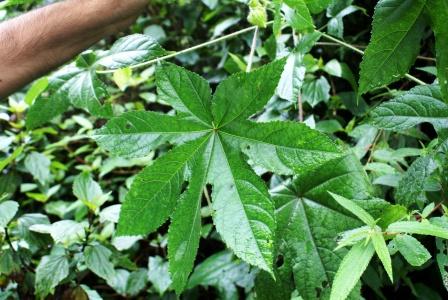
3. Seed hot infusion or cold infusion for male debility:
Seeds are soaked in water for 1-2 hours and later added to 4 times hot water. Macerated and filtered. Milk or sugar candy can also be added. This helps to relieve the fatigue and also the male debility.
4. Seed decoction for dry cough, mouth ulcers, dysuria and constipation:
The fresh decoction of the seeds is taken by adding sugar candy. This effectively pacifies the complaints like dry cough, mouth ulcers, dysuria and constipation.
General method of preparation of decoction (kashaya) – 1 tablespoon of powder is added with 2 cups of water, boiled and reduced to 1 cup, filtered.
In future days this herbal drug may get importance in the food and beverage industry as it can be used safely and directly in the preparation of nutritional health drinks and soft drinks. As this can be used in place of coffee seeds an alternate warm health drink can also be designed. As the world seeks and needs alternatives for the drinks like coffee and tea such drugs can be used quite effectively.
Sthanika Karma (Systemic Action)
Internal administration-
Digestive System – Improve taste and digestive fire, It has absorbent action. Can be used as a mouth freshener, cleanses the mouth. Indicated in anorexia, loss of appetite, diarrhea, loss of appetite.
Respiratory system – Indicated cough and breathing disorders. Pacifies kapha dosha
Circulatory system – Stimulate heart. Indicated in diminished functioning of heart.
Excretory System – Root and leaf juice is indicated in dysuria, urinary tract infection etc.
Reproductive system – Aphrodisiac, Indicated in impotency
Netra – Good for eyes (Chakshushya)










